People over Plastic
You’ve been with us for three seasons but this season we’re popping out with a whole new flavor. People over Plastic’s new environmental reporter Alexis Young and our host Shilpi Chhotray are bringing y’all digestible and relatable climate coverage in our ”All Eyes on the Gulf” series. Hear from Shilpi as she catches up with Alexis on the reporting she’s been doing out in New Orleans, Louisiana.
Episodes
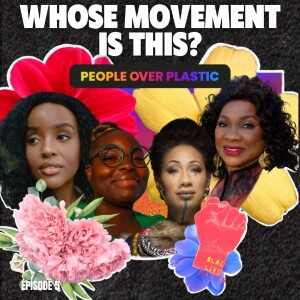
Wednesday Dec 13, 2023
Wednesday Dec 13, 2023
In our season finale, we shine a spotlight on the vital leadership of Black women in the realm of environmental justice. Often, after environmental catastrophes wreak havoc on frontline communities, well-funded environmental organizations descend like Trojan horses, offering solutions that often lack community input. In some cases, these organizations and their so-called 'relief' efforts blow in and out of communities as quickly as the crises themselves.
Today, our co-hosts Shilpi Chhotray and Alexis Young explore the enduring impact of Black women leaders who have nurtured spaces of care and refuge for communities on the frontlines of the climate justice movement. Joining us are remarkable individuals who have dedicated their lives to urgent issues that affect their communities.
Roishetta Sibley Ozane, founder of The Vessel Project of Louisiana; Dr. Beverly Wright, founder of The Deep South Center for Environmental Justice; and Wawa Gatheru, founder of Black Girl Environmentalist, share their journeys and insights. These visionary leaders have focused on creating sustainable, community-centered solutions that prioritize long-term well-being.
Join us for a captivating discussion as we honor the incredible contributions of Black women in environmental justice, highlighting their enduring commitment to communities that cannot escape the frontlines of the climate justice movement. You’ll want to listen to the very end for a special poem by internationally-acclaimed poet and activist Sunni Patterson.
Check out our website for additional reporting on guests featured on Season Four of The People over Plastic podcast. https://peopleoverplastic.co
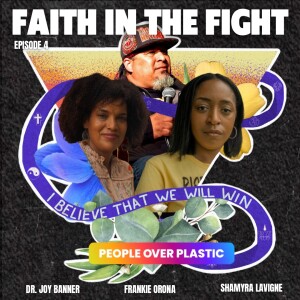
Wednesday Nov 29, 2023
Wednesday Nov 29, 2023
On today’s show, we delve into the profound role that faith plays for Black and Indigenous environmental organizers in their relentless pursuit of both climate justice and racial justice. Drawing inspiration from Matthew 17:20-21, which reminds us that even faith as small as a mustard seed can move mountains, we explore how they've harnessed their faith to drive change.
Joining us are remarkable individuals whose faith has moved industrial polluters and deepened their connection with the Earth. Dr. Joy Banner, Co-Founder of the Descendants Project, and Shamyra Lavigne, from Rise St. James, share their powerful narratives of how their faith compelled them to take action against industrial polluters, ultimately reclaiming their homes.
Additionally, Frankie Orona, representing The Society of Native Nations, sheds light on the ancestral wisdom passed down through generations—the kind of wisdom that encourages a profound and healing relationship with nature. Frankie advocates for this enduring connection with the Earth, one that soothes and honors our planet.
Tune in as our co-hosts Shilpi Chhotray and Alexis Young explore the intersection of faith, environmental activism, and the transformative power of belief in the fight for justice and the Earth's well-being.
Check out our website, peopleoverplastic.co, for additional reporting on Dr. Joy Banner, Shamyra Lavigne and Frankie Orona, and follow us on Instagram and TikTok.
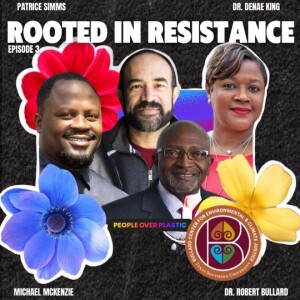
Wednesday Nov 15, 2023
Wednesday Nov 15, 2023
Welcome to a special live episode of "All Eyes on the Gulf." Join us as we sit down with Dr. Denae King and Michael McKenzie, champions in the fight for climate justice. With Dr. King's expertise in environmental toxicology and McKenzie's educational and extensive research background, they take us on a personal journey from their early work to their current community-based environmental initiatives in Houston and beyond.
Recorded at the Bullard Center for Environmental and Climate Justice at Texas Southern University, this dynamic conversation moved our live audience, and now, it's your turn to be part of the experience. Special guest Patrice Simms, a leading environmental attorney and scholar, and co-founder of People over Plastic, adds depth to the discussion, highlighting the urgency of their mission.
Opening this episode is Dr. Robert Bullard, who is known as the father of environmental justice. His speech emphasizes the historical significance of the environmental and climate justice movement.
Join co-hosts, Alexis Young, staff reporter for People over Plastic and Ryan Jeter, HBCU Coordinator at Environmental Defense Fund guide an extraordinary conversation that uncovers the roots of resistance in this live recording. Special thanks to the Plastic Solutions Fund for sponsoring this episode.
For more information about People over Plastic visit: www.peopleoverplastic.co and follow on Instagram and TikTok.
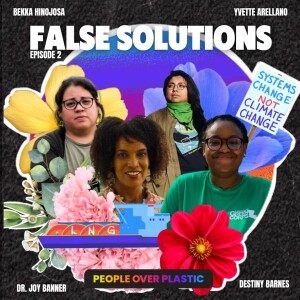
Wednesday Nov 01, 2023
Wednesday Nov 01, 2023
In today's episode, we'll explore the growing challenge faced by climate skeptics and those profiting from the fossil fuel industry. It's becoming increasingly difficult to ignore the undeniable impacts of oil and gas giants, the plastics industry, and the issue of environmental racism. In this context, we see the rise of false solutions that claim to protect our environment, but often prioritize profit over the well-being of people and the health of our planet.
Joining us today are two remarkable voices in the climate justice movement. Dr. Joy Banner, Co-Founder of the Descendants Project, and Yvette Arellano, Founder and Executive Director of Fenceline Watch, will help us dissect these false solutions that they encounter in the ongoing battle against industrial polluters.
We'll also be inspired by the stories of grassroots change-makers. Brownsville Community Activist Bekah Hinojosa will share insights into the challenges her community faces against SpaceX and LNG facilities. And Louisiana Green Corp graduate Destiny Barnes will shine a light on the positive steps being taken in her community to support clean energy and green infrastructure.
Tune in as our co-hosts Shilpi Chhotray and Alexis Young navigate the complex landscape of climate change, uncovering false solutions, and celebrating the real progress being made in communities like New Orleans, Louisiana.
For our podcast episode featuring South Baltimore organizer Shashwanda Campbell, tune in here. Don’t forget to check out our website <www.peopleoverplast.co> and follow us on Instagram and TikTok.
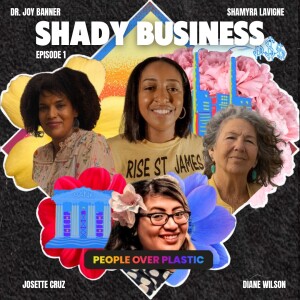
Wednesday Oct 18, 2023
Wednesday Oct 18, 2023
In the world of business, decisions can range from risky to downright shady. The line between the two blurs, especially in industries like oil, gas, petrochemicals, and plastic production. Land acquisition and permits for pollution resulting from the gruesome history of racial segregation and government-sponsored redlining often raise ethical questions.
In this episode of 'All Eyes On The Gulf,' the first episode of season four of The People over Plastic podcast, we dive deep into these murky waters. Our environmental reporter Alexis Young, connects with courageous environmental activists across the Gulf region, from Texas to Louisiana, unveiling the shady dealings in the oil and gas industry.
Prepare to hear the unfiltered truths from those on the frontlines. We're honored to feature voices like 2023 Goldman Prize Winner, Diane Wilson, who's taken on multi-billion dollar Formosa Plastic. Joining Alexis are also resilient community members, like Dr. Joy Banner, Co-Founder of the Descendants Project, Josette Cruz from Brownsville, Texas, and Shamyra Lavigne of Rise St. James, daughter of the 2022 Goldman Prize Winner, Sharon Lavigne.
Tune in for a powerful conversation between co-hosts Alexis Young and Shilpi Chhotray, shedding light on the shady decisions that impact our communities. It's time to unveil the truth behind the corporate smokescreens and the legacy of environmental racism.
RESOURCES:
Click here to see the “Banking on Climate Chaos” graphic. And for our podcast episode featuring Bernadette Dementieff of the Gwich’in Nation, tune in here. Don’t forget to check out our website for Alexis’ additional reporting on Dr. Joy Banner, Josette Cruz, Shamyra Lavigne and Diane Wilson and follow us on Instagram and TikTok.
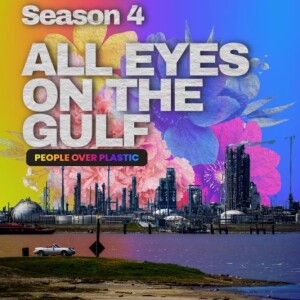
Wednesday Oct 04, 2023
Wednesday Oct 04, 2023
People over Plastic is thrilled to introduce our new series, 'All Eyes On The Gulf,' spotlighting voices of change and the pressing issues surrounding the US Gulf South - a major hub for plastic production and the fossil fuel industry.
In season four of The People over Plastic podcast, we celebrate our evolution into a multimedia platform and reflect on our journey with People over Plastic Co-Founder and Host, Shilpi Chhotray, alongside our newest co-host, PoP’s very own staff reporter, Alexis Young.
Over the last few months, Alexis has been connecting with environmental activists across the Gulf region and documented their inspiring stories from the frontlines of environmental activism. Our incredible lineup includes 2023 Goldman Prize Winner, Diane Wilson; Co-Founder of The Descendants Project, Dr. Joy Banner; Josette Cruz, a passionate member of the Brownsville, Texas community; Roishetta Sibley Ozane, mother of six and founder of the Vessel Project, and Shamyra Lavigne, the daughter of globally-celebrated environmental justice leader, Sharon Lavigne, Founder of Rise St. James.
Stay tuned for enlightening discussions, powerful narratives, and a deeper exploration of the challenges and solutions facing our planet. Now available on all major podcast apps.
Episode 1 drops on October 11th, be sure to follow and subscribe. For more information about People over Plastic visit: www.peopleoverplastic.co and follow on Instagram and TikTok.
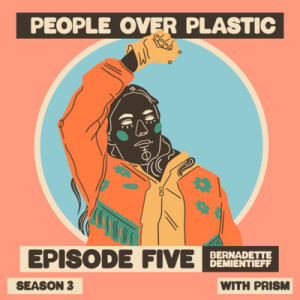
Thursday Jan 26, 2023
Thursday Jan 26, 2023
In our season finale, we bring your attention to the coastal plain of the Arctic National Wildlife Refuge (ANWR), known to the Gwich’in Indian Nation as “The Sacred Place Where Life Begins.” Hear the personal story of Bernadette Demientieff, a Gwich’in Steering Committee leader fighting to protect her Nation’s traditional lifeways.
The Gwich’in Indian Nation lives in 15 small villages scattered across northeast Alaska in the US to the northern Yukon and Northwest Territories in Canada. The Arctic is their home. The coastal plain of the ANWR has been a location of intense controversy between environmentalists, Native tribes, and the oil and gas industry. The coastal plain is also the birthing and nursing grounds of the Porcupine Caribou Herd - the very heart of the Gwich’in people. The caribou provide food and nourishment for the Gwich’in who are deeply connected to them on a spiritual level.
If oil drilling goes forward in ANWR, the birthrate of the caribou could decrease by 40% - it would be a cultural genocide for Bernadette’s tribe.
In 1988, the Gwich’in Steering Committee was formed in response to threats of oil development in ANWR’s coastal plain. Time and time again, Bernadette has testified in front of US Congress, the United Nations, and public hearings. She has met with banks and insurance companies funding oil infrastructure, framing the drilling and desecration of sacred lands as a Human Rights issue. As the issue of oil extraction gains urgency in the US and around the world, more pressure is put on the oil-rich region of the Arctic.
Key Themes explored:
How does ANWR benefit or suffer from its designation as public lands?
What tensions lie between extractive industries and those who call the Arctic their home?
What are the intersections between climate justice and racial justice in the Gwich’ins’ fight to protect their sacred lands?
How does Indigenous spirituality inherently connect Native people to their land?
How do Indigenous communities leverage the Rights of Nature to stop extractive practices?
Resources:
Take action now with the Gwich’in Nation.
Learn more about the Gwich’in Nation and Bernadette in this article in Mongabay: “Our identity is non-negotiable” and film by Patagonia: The Refuge | Fighting for a Way of Life
Prism articles covering Rights of Nature: Indigenous activists look to Rights of Nature laws to stop fracking and ‘Rights of Nature’ laws can strengthen Indigenous sovereignty and provide a pathway to environmental justice, written by Ray Levy Uyeda
Facts on oil consumption in the United States: Energy Information Administration
Visit People over Plastic’s website to learn more about us.
If there were ever a time to join us, it is now. Every contribution, however big or small, powers our BIPOC-produced storytelling and sustains our future. Support PoP from as little as $1 – it only takes a minute. Thank you. DONATE NOW.
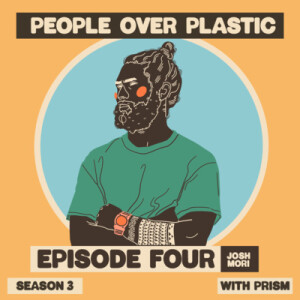
Thursday Dec 08, 2022
Thursday Dec 08, 2022
In this episode, we dive deep into the history of and activism for traditional Hawaiian farming with Josh Mori. Josh is the founder of Iwikua, an educational and cultural resource for sustainable food production, wellness, and community enhancement for West Kauaʻi.
Hawaii’s reliance on food imports began in the 1960s and has been further exacerbated by the locus for genetically modified (GMO) crop field trials. Kauaʻi in particular has been ground zero for GMO companies like Monsanto and BASF – serial violators of federal environmental laws. In recent years, local Hawaiians have been leading efforts based on old values and land practices to keep the islands healthy and the local population fed.
The controversies over the safety of growing and eating transgenic food are top of mind for Josh. His lived experience as an indigenous farmer resisting the agribusiness industry is a testament to his ancestral roots - shaped by a deep connection to the land, sea, and soil.
In this interview, he shares why teaching the next generation of local farmers how to cultivate the land to benefit West Kauaʻi goes beyond training and education – it’s personal.
This season, we’re honored to join forces with Prism - a nonprofit newsroom led by journalists of color to go deep into the stories behind environmental racism. Our co-founder and host Shilpi Chhotray and Prism’s climate justice reporter, Ray Levy Uyeda, examine how local Hawaiians are taking back food security and culture from American colonization, and the ongoing threats of climate change, militarism, and tourism.
Key Themes explored:
What does the growing food justice movement look like in West Kauaʻi?
What are the intersectional links between the agribusiness industry and Big Plastic?
How do the historical impacts of colonization and militarism affect local Hawaiian culture and food systems?
Why is tourism is a major threat to the cultural and political environment?
Tune in to the latest episode, Not my Mainland, to find out. This episode was generously sponsored by the Food and Farm Communications Fund.
Visit People over Plastic’s website to learn more about us and continue the conversation by sharing this episode on Instagram and Twitter.
Resources:
Prism article: Restoring Hawaiian fishponds revitalizes food systems and cultures, written by Ray Levy Uyeda
Learn about Josh’s organization IWIKUA and how to get involved.
Read more about Josh’s story in an interview for Feeding Hawai’i : Portraits of Resistance
As discussed, 27% of Native Hawaiians report food insecurity and that number is likely higher. Check out Food Insecurity in Hawaiʻi: A Data Brief for more information.
If there were ever a time to join us, it is now. Every contribution, however big or small, powers our BIPOC-produced storytelling and sustains our future. Support PoP from as little as $1 – it only takes a minute. Thank you. DONATE NOW.
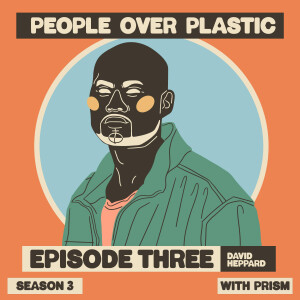
Tuesday Nov 22, 2022
Tuesday Nov 22, 2022
When it comes to the climate crisis, there is a stark divide between who is most affected due to the structural inequalities caused by the legacy of institutional racism. In “The First Responder”, we chat with David Heppard, the Executive Director of the Freedom Project Washington - a Seattle-based organization that works to dismantle the system of mass incarceration and heal its traumatic effects. Last year, the Freedom Project shifted its priorities to meet the community's immediate needs in the face of a devastating heat wave, with temperatures reaching a record of 115°F in June of 2021.
A recent study in Nature found that in nearly every major city in the U.S., people of color are exposed to more extreme urban heat than white people. Seattle’s neighborhoods nestled in abundant green space found reprieve from the intense heat. However, the communities of color closest to highways and industrial zones faced disproportionate health impacts and significant barriers to mental health care.
David's particular experiences, as a first responder in his community, is a powerful example of community investment and transformation. The Freedom Projects' counseling services and ability to provide water, fans, and space were instrumental in offering both mental and physical support during times of intense heat.
This season, we’re honored to join forces with Prism - a nonprofit newsroom led by journalists of color to go deep into the stories behind environmental racism. Our co-founder and host Shilpi Chhotray and Prism’s climate justice reporter, Ray Levy Uyeda, explore the historical significance of how neighborhoods have been shaped and built, to better understand the disparities that exist when it comes to extreme heat.
Key Themes explored:
What is the urban heat island effect and what does it have to do with systemic racism?
What is the link between redlining and environmental injustice?
Why do low-income BIPOC communities have more barriers to mental health care?
Why does the non-profit industrial complex incentivize top-down approaches to environmental and social issues?
Tune in to the latest episode, The First Responder, to find out.
Visit People over Plastic’s website to learn more about us and continue the conversation by sharing this episode on Instagram and Twitter.
Resources:
Prism article: Extreme heat increases the need for BIPOC mental health care written by Ray Levy Uyeda
Support FreedomProjectWA.org and consider donating directly to their cause
Disproportionate exposure to urban heat island intensity across major US cities in Nature
Read more about David's story in the Seattle Met
If there were ever a time to join us, it is now. Every contribution, however big or small, powers our BIPOC-produced storytelling and sustains our future. Support PoP from as little as $1 – it only takes a minute. Thank you. DONATE NOW.
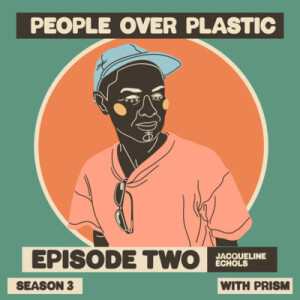
Thursday Oct 27, 2022
Thursday Oct 27, 2022
In episode 2: the Hot Seat, we hear from Jacqueline Echols about what’s happening in Atlanta where the South River Forest - one of the four “city lungs” - is under attack. Advocates and residents are rallying against a massive police training facility set for development on nearly 85 acres of beloved green space. Dr. Echols is an environmental justice advocate for 25 years and board president of the South River Watershed Alliance, an organization working to protect the river and adjacent forest ecosystem. Her more than two decades of work to improve water quality in Atlanta’s waterways and protect the city’s tree canopy earned her the 2017 Environmental Hero Award.
The forest in Southeast Atlanta is home to wetlands that filter rainwater, prevent flooding, and help the city stay resilient in the face of climate change. As Jacqueline impassionately shares, the proposed $90 million dollar training facility dubbed “Cop City” has sparked outrage from community members, where local officials are offering a red carpet layout under the pretext of preventing crime. The closest neighborhood to the forest is 77 percent Black and still reeling from ongoing protests against police brutality and racial injustice. Its residents will feel the immediate impacts of police presence and the loss of park space for generations to come.
This season, we’re honored to join forces with Prism - a nonprofit newsroom led by journalists of color to go deep into the stories behind environmental racism. Our co-founder and host Shilpi Chhotray and Prism’s climate justice reporter, Ray Levy Uyeda, investigate the symbiotic relationship between a rich ecosystem and the well-being of its community, and how “Cop City” threatens these safe spaces.
Key themes explored:
How does Cop City impact health issues, both physical and mental, with which the majority- Black community is already disproportionately affected?
Who is backing Cop City?
What does organizing against Cop City look like- including demonstrations, environmental analysis, and research aimed at city officials?
What is the link between environmental justice and racial justice?
Tune in to the latest episode, The Hot Seat, to find out.
Visit People over Plastic’s website to learn more about us and continue the conversation by sharing this episode on Instagram and Twitter.
RESOURCES:
Prism article: ‘Atlanta community members warn of environmental damage from ‘Cop City’ written by Ray Levy Uyeda
Take action at SouthRiverGa.org to demand environmental justice along the river and consider making a donation.
Jacqueline’s story in CNN: Atlanta wants to build a massive police training facility in a forest. Neighbors are fighting to stop it
If there were ever a time to join us, it is now. Every contribution, however big or small, powers our BIPOC-produced storytelling and sustains our future. Support PoP from as little as $1 – it only takes a minute. Thank you. DONATE NOW.

Your Title
This is the description area. You can write an introduction or add anything you want to tell your audience. This can help potential listeners better understand and become interested in your podcast. Think about what will motivate them to hit the play button. What is your podcast about? What makes it unique? This is your chance to introduce your podcast and grab their attention.





